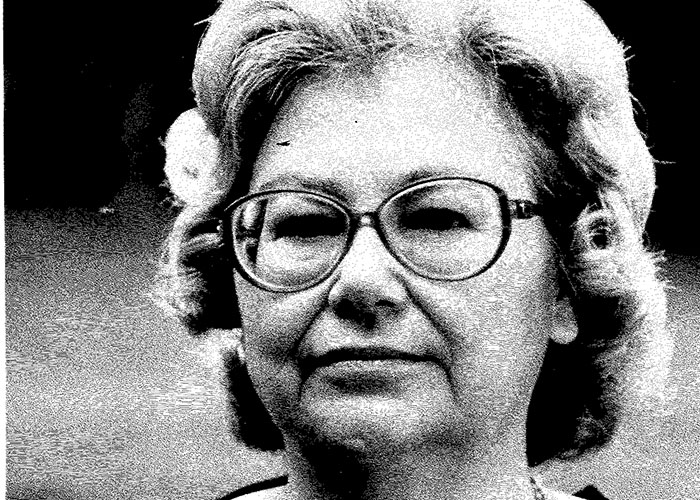“I’m old, you know,” said 87-year-old Claude Salle Perrier when explaining to VideoAge her difficulty in recounting some anecdotes of when she began working at MCA in 1953 in Paris.
To the rescue came Roger Cordjohn, who started at MCA in 1964, first in London and later in Paris, and remembered how much of a stickler Claude was for penmanship, requesting all job applicants submit a handwritten CV. Cordjohn retired from what became NBCUniversal in 2005, while Perrier retired in 1988 before it became MCA-Universal, when Japan’s Matsushita acquired it in 1990.
However, during the course of the seven months it took to complete this profile, Perrier came up with several anecdotes herself that helped VideoAge not only understand her as one of the pioneers of TV content distribution in France, and surely the first woman in the country in that position, but also as the likable, humorous and amusing person she has been all along: a bubbly executive worthy of her surname, which Claude Salle obtained in 1956 when she married Jacques Perrier, who later became a film production director (he passed away in 2010).
Claude S. Perrier’s career followed the ups and downs of the Hollywood studios in France, and entwined with the career of Jules C. Stein, who co-founded Music Corporation of America (MCA) in 1924, later becoming Universal Studios.
In 1953, after spending three years at an English school, Perrier joined the French office of MCA, then the world’s largest talent agency, as Stein’s assistant.
In 1950, Stein had bought a house for himself and his wife Doris in Paris, near the Etoile, which was also made available to his brother David and, later, to his partner since 1958, Lew Wasserman, and his wife Edith (Wasserman had joined MCA in 1936 as a booking agent). In 1949 Stein bought into Ci.Mu.Ra, a French talent agency on Avenue Hoche (not far from his house), renamed it MCA and put his brother David in charge. David hired Perrier as his assistant in 1956.
Here is how Perrier remembers it: “David was a gifted pianist, but Jules wanted him to work at MCA in Paris. It was David who hired me on the condition that not only was I to look after the foreign artists, but also to take care of Stein’s households in Paris, Ibiza and Algarve, Portugal. He preferred his music to working in an office, so at the office I was left more or less alone, reporting directly to Jules Stein and Lew Wasserman, who were in Los Angeles.”
However, for film and TV distribution, Perrier worked first under Berle Adams, who in 1957 was sent to Europe to create MCA’s international TV syndication division. Subsequently, Perrier reported to division head Ralph Franklin (1969-1980), followed by Bob Bramson (1980-1986), and finally to Colin Davis (1986-1997), before retiring in 1988. But even though Perrier retired from MCA-Universal, she continued to manage Stein’s family estates up until 1996 (Stein died in 1981).
The special relationship with both the Stein and Wasserman families gave Perrier privileged status, which she did not abuse or even leverage, but was useful in stamping out potential threats, like being fired by Franklin, with whom she did not get along (like other MCA executives and Hall of Fame honorees, such as Colin Davis and Michael J. Solomon, who also worked under him); like the others, she wouldn’t go into details about Franklin. However, VideoAge is aware that when Perrier visited Hollywood, she was invited to Jules Stein’s home and at times to his sister Ruth’s home in addition to Wasserman’s. In this regard, Perrier would only say that she “assisted in the celebration of Wasserman’s 50 years at MCA on December 12, 1986, where Frank Sinatra appeared on tape singing special lyrics.” (Sinatra had a tumultuous relationship with Wasserman, who had been his agent.)
Looking at archival photos, it is striking how in many of them Perrier is the only female executive. “Even though the industry was dominated by alpha males,” she acknowledged, “I never had any problems with most of them, possibly because they knew my work for Jules and Lew.”
The trajectory of MCA-Universal began in 1958 when MCA took over Universal Pictures’ 1.70-square km lot and subsequently MCA acquired the pre-1948 Paramount features. Universal Pictures (or Studios) was founded by German-born Carl Laemmie and eight other partners in 1908, while Paramount Pictures was founded by Hungarian-born Adolph Zukor in 1912.
In 1962, after MCA purchased Decca Records (the owner of Universal Pictures since 1952), Wasserman asked Adams, now an MCA vice president, to streamline the film studio’s 30 distribution offices around the world. Adams visited each of the domestic and foreign offices and managed to reduce the number of offices to eight.
Perrier picked up from where she left off: “In 1962 to avoid U.S. anti-trust laws, Jules Stein decided to close the agency branch. By then, MCA covered all aspects of the same business, therefore they had to close immediately one branch of activities. Everyone was asked to leave (including David Stein), except me, who was requested to stay to liquidate the company (and physically close the office on Avenue Hoche). Later on, I don’t remember whether it was Stein or Wasserman, one of them asked me if I liked to work in television, and if so if I would contact their lawyer to start a new company to be called MCA Paris Ltd with me as the manager.
“So, I moved to France Universal Studios’ office on Rue La Boetie, formed MCA Paris Ltd. and hired some of the personnel from the old MCA agency. I was selling pre-48 Paramount features, the Universal film catalog and their television series. At that time we had only one buyer from ORTF.”
The Office de Radiodiffusion-Télévision Française (ORTF) was the national government agency charged, between 1964 and 1974, with providing public radio and television in France. In 1974, ORTF split into seven successor institutions: TF1, Antenne 2 (now France 2), France Région 3 (now France 3), SFP, INA, TDF and Radio France.
Perrier further explained, “TF1, Antenne 2 and, later, France 3 had two buyers each: one for feature films, the other for TV series, which was very nice [not stressful]. Then, like mushrooms, the channels started to multiply and the ‘joy’ of having many buyers started to complicate our lives.”
Indeed, for Perrier, those were the most challenging times. “Trying to keep buyers at TF1 and France 2 happy when I had to tell one of them that they could not get the series they both wanted wasn’t easy, “ she recalled. “Neither was taking care of the television department and at the same time being involved in movie-making and looking after the stars.”
Perrier attended the very first MIP-TV in Lyon in 1963 for which she was recognized by the market’s organizers during MIP-TV’s 30th anniversary celebration at the Palm Beach Casino in Cannes in 1993. Here’s how she remembered it: “I was in Lyon briefly to find out about this new market. I sensed that it had potential and recommended that MCA-Universal pursue it should there be further exhibitions. But I’m glad it went to Cannes!”
From 1962 to 1995 MCA was the parent company of Universal Studios and in this regard there is an amusing anecdote recounted by Colin Davis: he didn’t like the name MCA TV because it “wasn’t clear to all that it was actually Universal Studios,” and at every occasion during trade shows, he would place a Universal sign under MCA TV on his stand.
When Perrier retired from MCA-Universal in 1988 with the title of vice president (“I’m not sure if it was SVP, I never cared about titles,” she said) she went to work first at TF1 with a two-year contract, then she went to the second channel Antenne 2 with a six-month contract (Antenne 2 became France 2 in 1992).
In 1991 Perrier started CSP, her own company in partnership with her younger daughter, Valérie, then 22 years old, to represent program sales from French and American companies. Perrier has an older daughter, Laurence, now 55 years old.
When Valérie did not want to continue in the partnership, CSP was closed and Perrier fully retired in 2000. Her younger daughter, now Valérie Piazza, elaborated: “The business was changing with producers wishing to deal directly with buyers. Plus, the old way of working had disappeared, ‘sharks’ freshly out of school were appearing with a lot of ‘political connections,’ so we decided it was time to close our distribution company and for me to create my own communication company.”
Subsequently, Valérie took two years off to deal with her father’s illness and when he passed away, Claude moved in with her. In 2012 she joined a production company specializing in ads for luxury goods.
“Those 10 years at CSP,” recalled Piazza, “served also to spend time together, which we never did before because she was working so much. Claude was often away and when at home on the phone at all hours of the day and night. But it was fun when I could travel with her and meet the Hollywood stars. Also it made me realize how, as a woman in a man’s world, she also had to deal with ‘funny’ circumstances.
“When we worked together, we even opened a restaurant in Paris (Champagne bar with Scandinavian tapas) and produced a theatrical movie, Nous Resterons Sur Terre.”
Looking back, Perrier recalled when in 1956 she received a telegram from a top-level MCA executive in Hollywood requesting, “that I buy as many old cobble stones as possible. They were being taken out of Parisian streets because they were too slippery. I managed to buy them from the city and shipped them from the port of Le Havre to the MCA studio, where they were used to build the pavement of a European square with a French cafe. The leftovers were used to build Stein’s driveway and he even invited me to his Hollywood house to see it.
“After that, the studio asked me to ship to Hollywood all kind of items… from French police uniforms to an old Parisian bus. At one point I had to supervise a music film recording in Paris during the musicians’ strike in the U.S. I also sent to Hollywood some fabrics that Mr. and Mrs. Sheinberg had bought in France.” [Sid Sheinberg was MCA Inc. president from 1973 to 1995]
The first time she was asked to go to the Los Angeles headquarters was to screen Universal movie Sweet Charity on March 26, 1969. “Stein chartered a Pan Am airplane and flew all the European executives to Hollywood for the screening,” recalled Perrier.
After that, she attended all editions of the L.A. Screenings (up until 1983 they were called “May Screenings” before VideoAge created the new name) until 1990. About the Screenings, Perrier liked the fact that competition made stations “buy entire series; no more cherry picking, and contracts were signed on the spot.”
Reached on the phone in Las Vegas, where she was vacationing with her daughter Valérie (after visiting Lake Powell, on the Utah border), for this feature’s final fact-check, she asked to include her recollection of “that time I sent a film reel to Tunisia and the custom officials, not knowing what it was, completely unspooled it and sent it back all tangled up.”
About the Las Vegas visit, her former boss now retired, Robert (Bob) Bramson lamented that, “Claude and Valérie still come to Las Vegas for a three-week vacation and each year they call me, but unfortunately I can’t make the trip. As for Claude, I can tell you that she ran the Paris office pretty smoothly and quite differently from all of our other offices, and that speaks well for her.”
(By Dom Serafini)
Audio Version (a DV Works service)











Leave A Comment